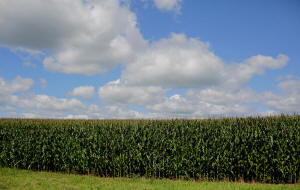Bunge, ADM to benefit as US farmers sell cheap crops in 'haul of shame'
 Send a link to a friend
Send a link to a friend
 [August 05, 2024] By
Tom Polansek and P.J. Huffstutter [August 05, 2024] By
Tom Polansek and P.J. Huffstutter
CHICAGO (Reuters) - A spike in bargain-basement crop sales by U.S.
farmers needing to make room in storage bins for autumn harvests could
boost profitability at grain handlers such as Archer-Daniels-Midland and
Bunge Global.
Both companies, which trade and process soybeans and corn and benefit
from geographic differences in supply, recently flagged slow farmer
selling as a drag on second-quarter earnings.
Eight farmers in the key Midwestern crop-growing states of Iowa,
Indiana, Illinois and Ohio told Reuters they are emptying storage bins
of corn and soybeans harvested in 2023 after holding tight to supplies
all year, as favorable weather for crop development finally dashes their
hopes for higher prices.
Farmers earlier resisted sales as corn and soy futures prices sank to
2020 lows this year under pressure from large supplies.
Low prices are also driving some to use less crop chemicals, which could
create a short-term pinch for agribusinesses like Corteva Inc and
Syngenta, analysts said.
Increased sales should result in cheaper soybean ownership for ADM and
Bunge, which process the crop into soybean oil and meal used for
livestock feed, said Heather Jones, founder of Heather Jones Research.
More farmer selling also helps ADM and Bunge obtain supplies to use any
excess manufacturing capacity, said Arun Sundaram, senior equity analyst
at CFRA Research.

"Agribusinesses operate with a lot of overhead and have high fixed
costs, so running manufacturing plants at or near capacity is key to
preserving efficiencies and margins," he said.
'HAUL OF SHAME'
Growers, who are projected to suffer the largest ever year-to-year
dollar drop in farm income in 2024, previously hoped that poor weather
or geopolitical disruption would spark a rally.
"I'm throwing in the towel and making room for the new crop," said Ron
Heck, a farmer in Perry, Iowa. Farmers start harvesting what the U.S.
government expects to be the third largest corn crop and second largest
soybean crop in September.
Heck said he recently hauled corn as fast as he could to a local plant
owned by POET LLC, the world's largest ethanol producer, that offered to
pay cash prices 42 cents per bushel, or about 10%, higher than futures.
Selling accelerated in the Midwest in late July as forecasts for hot,
dry weather lifted futures to two-week highs, grain dealers said. The
gains were short lived, as markets again collapsed to 2020 lows last
week.
"We didn't get the hot, dry predicted weather, and there was no point in
waiting for a weather rally," Heck said.
One grower in Illinois described farmers taking grain to local
facilities for sale as the "haul of shame" because they should have sold
earlier when prices were higher.

[to top of second column] |

Clouds hover above a corn field in Dubuque, Iowa, U.S., July 26,
2018. REUTERS/Joshua Lott/File Photo

SELLING AT A LOSS
Justin Campbell, who farms outside Terre Haute, Indiana, is among
those who booked sales last week as corn prices declined.
"I thought, 'We haven't found a bottom yet in prices,' so I wanted
to get some of it priced," Campbell said.
Another Indiana farmer, who requested anonymity because he does not
want neighbors to know about his sales, said he recently finished
selling last year's corn to an ADM elevator for $3.54 per bushel,
below his cost of production. He needed cash to make a payment that
was coming due on an equipment loan.
Bunge, the world's largest oilseed processor, expects more farmer
sales after its profit margins suffered in the April-June quarter
from slow selling in North and South America, CEO Greg Heckman said
last week. Bunge raised its full-year outlook, citing improving
processing margins, following a 56% decline in adjusted
second-quarter agribusiness earnings from a year earlier.
"The weather, it looks good," Heckman told analysts on an earnings
call. "I think as you see that North American crop develop, we'll
see some more marketing there."
Without making much money from farming, some growers said they are
buying less fungicide, insecticide, fertilizer and equipment.
Chris Gibbs, who farms about 375 acres in Ohio, said he was not
going to buy and pay for fungicide to be applied across all his
fields to prevent plant disease as he normally does.
"I'm going back to walking the beans and corn rows, looking for
problems in the field and only treating areas that absolutely need
the help," Gibbs said.
Illinois farmer Dave Kestel said he is spraying fungicide on less
than half his corn fields, cutting his use of a Corteva product
called Aproach. Corteva on Wednesday cut its annual sales and
operating earnings forecasts due to tighter farmer margins.

Still, farmers tend to pay up for seeds that promise to produce
hefty yields, said Seth Goldstein, strategist at Morningstar
Research Services. And deciding to cut back on chemicals can be
tricky because growers want to produce big harvests to make the most
money they can at low prices.
"Even in a down market, you still have to protect the crop," said
Kristen Owen, executive director of equity research at Oppenheimer &
Co.
(Reporting by Tom Polansek and PJ Huffstutter. Additional reporting
by Heather Schlitz in Chicago; Editing by Caroline Stauffer and Anna
Driver)
[© 2024 Thomson Reuters. All rights
reserved.]
This material may not be published,
broadcast, rewritten or redistributed.
Thompson Reuters is solely responsible for this content. |